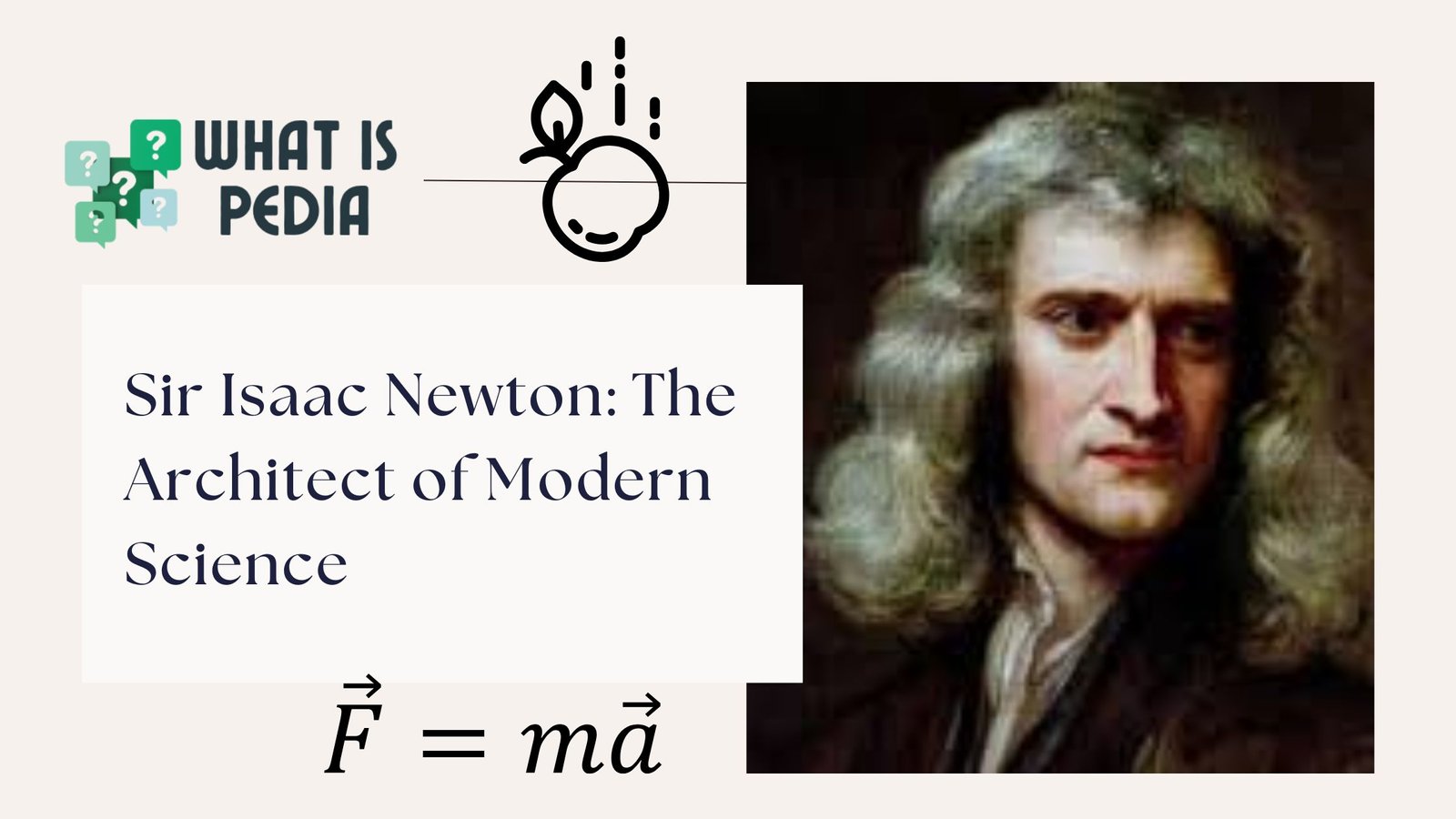Introduction to Sir Isaac Newton
Sir Isaac Newton, a central figure in the scientific revolution, is renowned for his profound contributions to physics and mathematics. Known as the father of physics, Newton’s laws of motion and universal gravitation were groundbreaking and laid the foundation for modern physics. His work not only defined the laws of motion and universal gravity but also played a pivotal role in the development of calculus. Newton’s enduring legacy is a testament to his brilliant mind and his monumental impact on science.
Early Life and Education
Birth and Early Childhood
- When and Where Was Isaac Newton Born: Sir Isaac Newton was born on December 25, 1642, in Woolsthorpe, Lincolnshire, England.
- Information About Isaac Newton’s Parents:
- Father: Isaac Newton, Sr., a prosperous farmer who passed away before his son’s birth.
- Mother: Hannah Ayscough Newton, who remarried when young Isaac was three years old, leaving him in the care of his maternal grandparents.
These early experiences shaped the young Isaac Newton and his path toward scientific greatness.
Academic Pursuits
- Where was Isaac Newton Educated: Isaac Newton was educated at The King’s School, Grantham, where he displayed an early aptitude for learning. Later, he attended Trinity College, Cambridge, starting in 1661, which became the ground for his major discoveries.
- Insight into Isaac Newton’s School and Early Education:
- Initial Schooling: At The King’s School, Grantham, Newton was initially more interested in innovative mechanical devices than his studies.
- University Education: At Trinity College, his academic interests blossomed under the freedom of university curriculum, allowing him to explore beyond the traditional Aristotelian teachings.
- Scholarship and Achievements: Newton received a scholarship in 1664, which allowed him to earn a Bachelor’s degree and pursue his master’s studies.
- Early Innovations: During his time at university, Newton began developing theories on calculus, optics, and the laws of motion and gravitation.
These educational experiences were crucial in shaping Isaac Newton’s pioneering contributions to science.
Career and Major Contributions
Breakthroughs in Physics
- Foundational Theories: Isaac Newton’s formulation of the three laws of motion laid the groundwork for classical mechanics, making him a central figure in the scientific revolution and justifying his title as the father of physics.
- Mathematical Innovations: Newton co-developed calculus, providing a powerful mathematical tool used to describe the motion of objects and the forces acting upon them.
- Optics and Light: His experiments with prisms and theories on light and color further established his reputation in physics and beyond.
- Royal Society Presidency: Newton’s leadership at the Royal Society helped shape the direction of British science during his tenure.
The Discovery of Gravity
- The Apple Incident: Legend has it that Newton formulated his theory of gravity after witnessing an apple fall from a tree, leading to his insights about the forces that govern motion both on Earth and in the cosmos.
- Universal Gravitation: Newton proposed that every particle in the universe attracts every other particle with a force that is proportional to the product of their masses and inversely proportional to the square of the distance between their centers.
- Published Works: His theories on gravity were published in his seminal work, “Principia Mathematica,” which articulated the laws of motion and universal gravitation, laying the foundation for classical mechanics.
- Impact on Astronomy: Newton’s law of universal gravitation allowed astronomers and physicists to predict the movements of planets and other celestial bodies more accurately than ever before.
These contributions highlight why Isaac Newton is often revered as the definitive father of physics and a key figure who helped unlock the mysteries of gravity and motion.
Personal Life
Family and Relationships
- Marital Status: Isaac Newton never married, focusing his life primarily on scientific research and academic pursuits rather than personal relationships.
- Close Associations: Despite his solitary nature, Newton did form a few significant friendships throughout his life, particularly with other scientists and scholars like Edmond Halley, who played a crucial role in the publication of Newton’s Principia Mathematica.
- Intellectual Circle: Newton was a prominent member of the Royal Society, where he interacted with many leading figures of his time, which helped foster intellectual exchange but also led to several intense rivalries, notably with Robert Hooke.
- Personal Disposition: Known for his complex character, Newton had relationships marked by both generosity and contentiousness, which impacted his professional collaborations and personal connections.
These aspects of his personal life illustrate that while Newton was a towering figure in science, his personal relationships and Isaac Newton’s interpersonal dynamics were equally complex and shaped his life profoundly.
Isaac Newton’s Philosophical Quotes
Legacy Through Words
- Seeking Truth: “To myself, I am only a child playing on the beach, while vast oceans of truth lie undiscovered before me.“
- On Discovery: “What we know is a drop; what we don’t know is an ocean.“
- On Learning with Humility: “If I have seen further, it is by standing on the shoulders of giants.“
- On Work and Human Nature: “I can calculate the motion of heavenly bodies, but not the madness of people.“
These quotes reflect Sir Isaac Newton’s philosophical depth and his perspective on science, knowledge, and human nature, showcasing his enduring influence through words as well as mathematics and physics.
The Final Years
Later Life and Death
- When and Where Did Isaac Newton Die: Isaac Newton passed away on March 31, 1727, in Kensington, London, England.
- Legacy: Newton was buried with high honors in Westminster Abbey, an indication of the immense respect he commanded.
Lasting Impact
- Continued Relevance: Isaac Newton’s laws of motion and universal gravitation remain foundational in physics, teaching, and in practical applications in engineering and astronomy.
- Inspiration Across Disciplines: Beyond science, Newton’s approach to problem-solving and his methods of inquiry inspire disciplines including mathematics, optics, and even economics.
These elements highlight how Isaac Newton’s contributions have profoundly shaped not only science but various aspects of modern thought and technology.
Fascinating Aspects of Newton’s Life
Interesting Facts About Newton
- Master of the Mint: Besides his scientific achievements, Newton was appointed the Warden and then the Master of the Mint, significantly reforming England’s currency.
- Alchemical Research: Newton spent a great deal of time on alchemy, with his writings on the subject only coming to light many years after his death.
- MP for the University: Newton also served as a Member of Parliament for the University of Cambridge, although he reportedly spoke little during his tenure.
These lesser-known facets of Isaac Newton’s life showcase a man of diverse interests and talents beyond his monumental contributions to science.
Conclusion
Sir Isaac Newton’s monumental impact on science and culture is undeniable. As the father of physics and the man who discovered gravity, his theories and laws have laid the foundational stones upon which modern science is built. His intellectual legacy continues to influence not only physics but also various fields across the scientific and cultural spectrums.
For a deeper exploration of Newton’s life and contributions, consider visiting resources like Whatispedia for comprehensive insights into his enduring influence.







